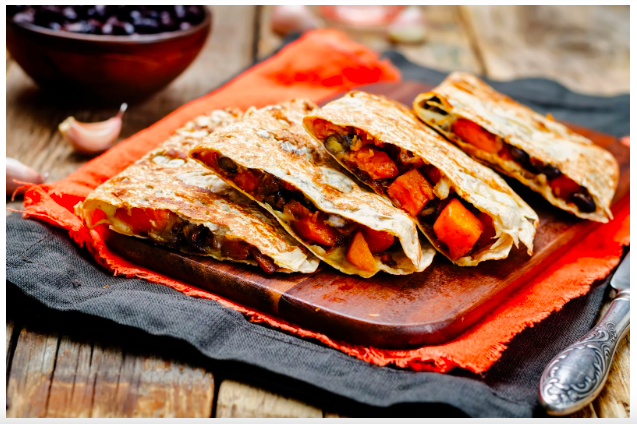This Mexican dish is a plant-based variation of the typical beef or chicken quesadilla. It is heart-healthy and high in protein and fiber. You can serve this quesadilla with salsa, guacamole, sour cream, and cheese for added flavor and nutrients!
Ingredient Highlights
The sweet and savory filling from the black beans and sweet potatoes in this quesadilla make it a delicious dish for those who want a vegetarian alternative.
Black beans are rich in protein and fiber. Protein has many functions, including promoting a healthy immune system and building muscle [i].
Sweet potatoes provide a good source of manganese. Manganese is an important nutrient that helps aid in metabolism, bone development, and vitamin absorption. Manganese is a part of the antioxidant enzyme superoxide dismutase (SOD), a crucial antioxidant in the body [ii]. Antioxidants help the body protect against free radicals, which are molecules that can cause damage to cells in the body. Free radicals are said to be involved in aging, heart disease, and some cancers [iii]. SOD helps combat the negative effects of free radicals by converting superoxide, a dangerous free radical, into smaller molecules that will not cause damage to the cells [iv]. Sweet potatoes also contain vitamin C and vitamin B6, along with potassium and fiber [v].
Recipe
Black Bean and Sweet Potato Quesadillas
Serves: 4

Ingredients
- 2 Tbsp avocado oil
- 1 small onion, diced
- 3 cloves garlic, minced
- 3 cups peeled grated sweet potatoes (about 1 pound unpeeled)
- 1 tsp chili powder
- 1 tsp ground cumin
- 1 Tbsp dried parsley flakes
- 1 15-oz. can low-sodium black beans, drained
- 1 cup frozen corn, thawed
- 4 large (8-inch) whole-grain tortillas
- Nonstick cooking spray
Instructions
- Heat oil over medium heat in a large skillet.
- Add onion and garlic. Stir.
- Cover and cook for 8 minutes, stirring often.
- Add sweet potatoes, chili powder, cumin and parsley. Stir.
- Cover and cook for 10 minutes, stirring often.
- Stir in beans and corn and cook for 1 minute or until heated through.
- Spread ¼ of the filling on one-half of each tortilla. Make sure to leave a ½-inch border around the edges without filling.
- Fold each tortilla, pressing the edges together. (If the edges don’t stick together, brush oil around the inside edge.)
- Spray a large skillet with nonstick cooking spray.
- Heat skillet to medium-high heat.
- Add quesadillas and cook for 2 to 3 minutes, turning halfway through. Quesadillas are ready when tortillas are slightly browned.
Notes:
- Make these quesadillas gluten-free by using gluten-free tortillas, such as corn tortillas or almond flour based tortillas.
- Add more vegetables with any you prefer or may have in the fridge.
- Add cheese or a plant-based cheese as desired. Plant-based cheese usually melts a little differently, so it is important to know how your preferred dairy-free cheese works!
- Cooked pinto beans or lentils work well in place of black beans, if desired.
- For those who prefer meat in their quesadillas, cooked beef, chicken or even shrimp is a great addition or replacement for the beans.
- Add some spice! If you like your food to be a little spicy, you can make these sweet potato quesadillas fit to your preference! Increase the amount of chili powder, use salsa, or toss in some jalapeños. If you do not tolerate spicy foods, try cinnamon or paprika.
- To make the ingredients come together even faster, cook the sweet potatoes ahead of time and warm up with the beans.
- Quesadillas are usually best when enjoyed fresh, however, you can make a nice big batch of these and enjoy them for days to come if you like!
References:
[i] Havemeier S, Erickson J, Slavin J. Dietary guidance for pulses: the challenge and opportunity to be part of both the vegetable and protein food groups. Ann N Y Acad Sci. 2017;1392(1):58-66. doi:10.1111/nyas.13308.
[ii] Holley AK, Bakthavatchalu V, Velez-Roman JM, St Clair DK. Manganese superoxide dismutase: guardian of the powerhouse. Int J Mol Sci. 2011;12(10):7114-7162. doi:10.3390/ijms12107114.
[iii] Pham-Huy LA, He H, Pham-Huy C. Free radicals, antioxidants in disease and health. Int J Biomed Sci. 2008;4(2):89-96.
[iv] Li C, Zhou HM. The role of manganese superoxide dismutase in inflammation defense. Enzyme Res. 2011;2011:387176. doi:10.4061/2011/387176.
[v] Sweet potatoes. Harvard T.H. Chan School of Public Health. The Nutrition Source. Accessed: June 04, 2022.
